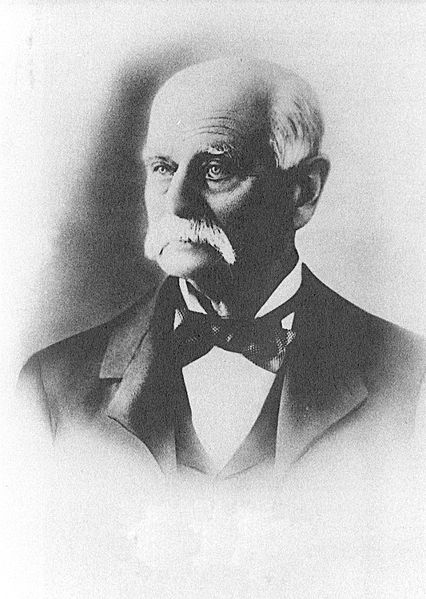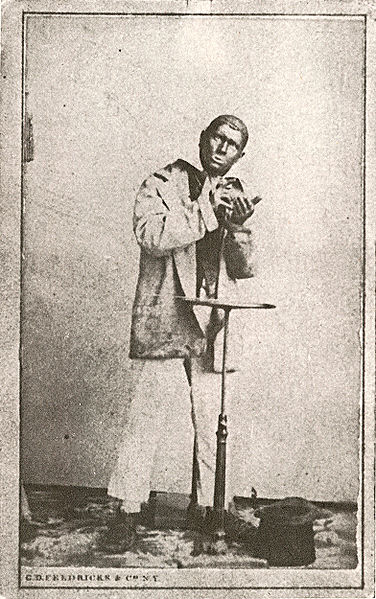<Back to Index>
- Historian Pierre François Xavier de Charlevoix, 1682
- Songwriter Daniel Decatur "Dan" Emmett, 1815
- Prime Minister of the Netherlands Abraham Kuijper, 1837
PAGE SPONSOR


Daniel Decatur "Dan" Emmett (October 29, 1815 – June 28, 1904) was an American songwriter and entertainer, founder of the first troupe of the blackface minstrel tradition.
Of Irish ancestry, he was born at Mount Vernon, Ohio, then a frontier region. Growing up with little formal education, he learned popular tunes from his musical mother, and self taught himself to play the fiddle. At age 13, he became an apprentice printer and enlisted in the United States Army. He became an expert fifer and drummer at Jefferson Barracks, Missouri, and published his own Fifer’s and Drummer’s Guide in 1862 in cooperation with George G. Bruce. After receiving his discharge from the army on July 8th, 1835, he joined a Cincinnati circus. In 1840 - 1842 he toured with Angervine and other circuses as a black face banjoist and singer.
In association with Billy Whitlock, Dick Pelham, and Frank Brower, he organized the Virginia Minstrels, which made their first appearance before a paying audience at the Chatham Theatre in New York City in 1843.
Although
blackface performance, in which white men painted their hands and faces
black and impersonated caricatures of black men and women, was already
an established performance mode at that time — Thomas D. Rice had created the character of Jim Crow nearly
a decade earlier, and blackface had been widely popular ever
since — Emmett's group are said to be the first to "black up" an entire
band rather than one or two performers. The group's full - length
blackface performance is generally considered to have been the first
true minstrel show: previous blackface acts were usually either an entr'acte for a play or one of many acts in a comic variety show.
Notable songs written by Dan Emmett include: "The Blue Tail Fly" - [although he didn't write the "Jimmy Crack Corn" chorus] - Abraham Lincoln called it the "buzzing song" and it was his favorite song;" Old Dan Tucker"; "The Boatman's Dance"; "The Road to Richmond"; "Walk Along, John"; "Early in the Mornin'". He is also sometimes credited with the composition of "Turkey in the Straw", but the authorship of this song is still contested by music historians.
Dan Emmett is traditionally credited with writing the famous song "Dixie". The story that he related about its composition varied each time he told it, but the main points were that he composed the song in New York City while a member of Bryant's Minstrels. The song was first performed by Emmett and the Bryants at Mechanics' Hall in New York City on April 4, 1859. The song became a runaway hit, especially in the South, and the piece for which Emmett was most well known. Emmett himself reportedly told a fellow minstrel that "If I had known to what use they [Southerners] were going to put my song, I will be damned if I'd have written it." After the South began using his song as a rally, Emmett wrote the fife and drum manual for the Union Army. Emmett's song was a favorite of President Abraham Lincoln, who said after the war ended in 1865: "I have always thought that 'Dixie' was one of the best tunes I ever heard. I had heard our adversaries had attempted to appropriate it. I insisted yesterday that we had fairly captured it."
Another writer named William Shakespeare Hays (1837 - 1907) (pen name: Will S. Hays), claimed to be its true author. Members of the Snowden Family of Knox County, Ohio, have also been named as writers of the song. After a tour that was notably successful in the south Emmett retired to his hometown of Mount Vernon in 1888 where
he died on June 28, 1904, aged 88 years. From the time of 1893 to the
time of his death, he was aided by a weekly allowance from the Actor’s Fund of America. Emmett was inducted into the Songwriters Hall of Fame in 1970. In 1943, Paramount Pictures released a film about his life entitled Dixie. It starred Bing Crosby as
Emmett. Numerous schools, businesses, and other institutions in Mount
Vernon, Ohio, are named after Emmett. The official memorial to him is a
large boulder with a placard attached located in front of the Knox County Historical Museum. During
Emmett’s lifetime, Emmett published at least 30 songs between 1843 and
1865, most of which are banjo tunes or walk - arounds. During 1859 and
1869, he composed another 25 tunes that are still in manuscript at the
Ohio Historical Society, in Columbus.